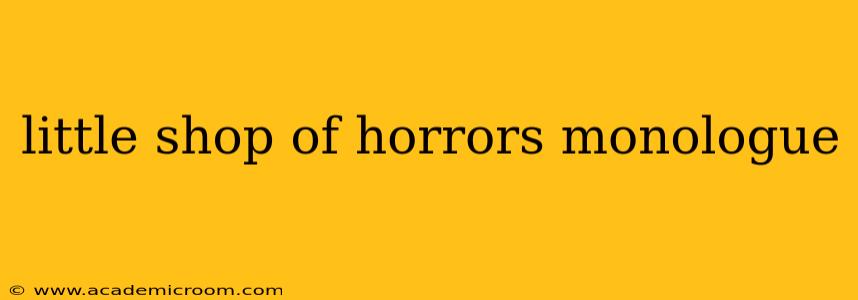The chilling, captivating monologue delivered by Audrey II in Little Shop of Horrors is more than just a theatrical flourish; it's a potent symbol of unchecked desire, the seductive nature of power, and the terrifying consequences of unchecked ambition. This seemingly simple plant's words resonate deeply because they tap into primal fears and desires, making it one of the most memorable moments in musical theatre history. This exploration will delve into the nuances of the monologue, exploring its themes and analyzing its impact.
What Makes Audrey II's Monologue So Effective?
The genius of Audrey II's monologue lies in its deceptive simplicity. The language is straightforward, almost childlike at times, yet the underlying message is horrifying. The plant's insatiable hunger isn't just for human flesh; it's a metaphor for the insatiable nature of ambition, greed, and the dark side of human nature. The seemingly innocent requests quickly escalate into demands, mirroring the way unchecked power can corrupt.
The contrast between Audrey II's innocent-sounding requests and the gruesome reality of what he requires creates a disturbing tension. This tension is further heightened by the theatrical presentation – a seemingly harmless plant revealing a terrifying inner nature. The audience is both fascinated and repulsed, drawn into the plant's hypnotic power.
What are the Key Themes Explored in the Monologue?
Several key themes intertwine to create the monologue's power:
The Allure of Power and Control: Audrey II's demands start small but rapidly grow, mirroring the intoxicating nature of power. The initial request for blood is followed by more extreme requests, showcasing the addictive nature of control. He cleverly manipulates Seymour, playing on his desires and fears to achieve his goals.
The Dangers of Unchecked Ambition: Seymour's desire for success and love directly contributes to the plant's power. His ambition blinds him to the danger, a cautionary tale about the corrupting influence of unchecked desires. He sacrifices his morals and eventually, potentially his life, in pursuit of what Audrey II promises.
The Seduction of Evil: Audrey II's voice is strangely charming, even as he makes horrifying demands. This seductive quality highlights the danger of evil that presents itself as alluring or desirable, masking its true nature.
The Inevitability of Destruction: The monologue's inherent tension highlights the inevitable destructive path that follows the acquisition of unchecked power. The plant's relentless growth and demands foreshadow the catastrophic consequences of Seymour's actions.
What is the Significance of the Monologue's Structure?
The structure of the monologue reinforces its themes. The escalation of requests mirrors the plant's growing power and Seymour's deepening entanglement. The seemingly innocent beginnings quickly give way to increasingly sinister demands, highlighting the insidious nature of the plant's influence.
How Does the Monologue Contribute to the Overall Narrative?
The monologue serves as a pivotal turning point in the narrative. It marks the moment when Audrey II truly takes control, shifting the balance of power from Seymour to the plant. The monologue also underscores the play's central themes, emphasizing the consequences of unchecked ambition and the seductive nature of evil.
Why is Audrey II's Monologue So Memorable?
The combination of chilling lyrics, unforgettable delivery, and compelling theatrical presentation makes Audrey II's monologue truly unforgettable. It's a masterpiece of theatrical writing that remains potent and relevant, capturing the dark side of human nature and the dangers of unchecked ambition. The monologue continues to captivate audiences, solidifying its place as a cornerstone of musical theatre history.
This analysis only scratches the surface of the rich complexities within the monologue. Its enduring power comes from its ability to tap into universal fears and desires, making it a truly unforgettable theatrical experience.
